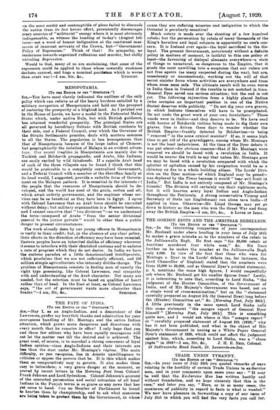MESOPOTAMIA.
(To THE EDITOR OF THE " SPWFATOR."3
SIR,—You lave most clearly indicated the outlines of the mill policy which can relieve us of the heavy burdens entailed by a military occupation of Mesopotamia and hold out the prospect of restoring the prosperity of a blighted land. As I pointed out in the House of Lords, we have a model in the Federated Malay States which, under native Rule, but with British guidance, las attained wonderful prosperity. The principal States are all governed by hereditary Sultans with British residents by their side, and a Federal Council, over which the Governor of the Straits Settlements presides, deals with matters common to all the States. The population is less homogeneous than that of Mesopotamia because of the large influx of Chinese; but geographically the isolation of Malaya is an evident advan- tage. Our recent troubles in Mesopotamia are mainly due to Turkish and Bolshevik propaganda, and Arabs, like Indians, are easily excited by wild falsehoods. If a capable Arab head of each of the three villayets can be found I think that this would be preferable to a completely centralized Government, and a Federal Council with a member of the Sheriffian family at its head would, I suggested, provide a suitable form of Govern- ment on the Malayan pattern. It is essential in the interests c 2 the people that the resources of Mesopotamia should be de- veloped, and the world has need of the grain, cotton and oil, which await orderly government, and the engineer whose ser- vices can be as beneficial as they have been in Egypt. I agree with Colonel Lawrence that an Arab force should be recruited without delay; but military organization is a Western business, and I cannot conceive that "two divisions "—as we understand the term—composed of Arabs "from the senior divisional general to the junior private" would be other than a public danger in present circumstances.
The work already done by our young officers in Mesopotamia is vastly to their credit; but, in the absence of any clear policy, their efforts in the direction of efficiency may have been resented. Eastern peoples have an inherited dislike of efficiency wherever it seems to interfere with their clherished customs and to enforce a rate of progress whieh they do not desire. In India we have the onrious paradox of a little denationalized intelligentsia, which proclaims that we are not sufficiently efficient, and 250 million simple agriculturists who intensely dislike clangs:. The problem of Mesopotamia consists in finding men of exactly the right type possessing, like Colonel Lawrence, real sympathy with and understanding of the Arab character. Not many are needed, but the selection must be based on qualities of heart rather than of head. In the East at least, as Colonel Lawrence says, "the art of government wants more character than


































 Previous page
Previous page